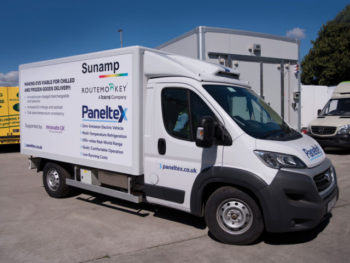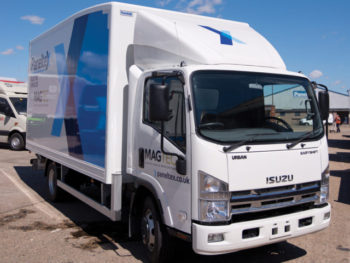With the adoption of electric vans, comes a demand for alternative power for fridges, says Dan Gilkes.

Temperature-controlled specialist Paneltex is working in a consortium of companies, to develop alternative power for fridge and freezer bodies, that can be installed on electric vans and trucks. To date the group has built two vehicles, both based on an electric Fiat Ducato chassis cab, which will commence trials with operators in September.
The project, which is being led by thermal energy storage experts Sunamp, uses the company’s compact domestic Heat Batteries to provide the cooling for the van bodies. Sunamp inverts the Heat Battery technology, to create cold storage technology, that is said to be more efficient than lithium-ion batteries and with a better power-to-weight ratio.
Originally, when the project started in August 2016, it had been thought that the cold storage units would be loaded into the vans in a similar way to older eutectic beams. However, Sunamp has devised a way to make its cold storage batteries last up to eight hours from a single charge. They are mounted in the freezer compartment of the body, providing temperatures down to -18° C. Cold air is then transferred to the fridge compartment, where it provides -5°C and then on to the ambient compartment, which has been designed to work for the majority of supermarket home deliveries.
“They can drop a lot of temperature really quickly,” said Sam Berridge, European sales manager at Paneltex, making it possible to carry out multiple door openings.
“We don’t want to change the way the customer operates. We wanted it to work for a retailer in the same way as a conventional diesel-powered refrigerated van.”
The two Fiat chassis have been converted to electric drive by Turkish company BD Auto. The Ducato was chosen as it was one of the only van models available with a gross weight of 4.25-tonnes, meeting the new maximum weight for an electric commercial vehicle that can be driven by a car driver without an Operator’s licence.
“We wanted 4.25-tonnes for the supermarkets,” said Berridge.
One of the test vehicles will use the van’s traction batteries to power a conventional fridge unit, reducing the potential driving range, while the second will be equipped with the Sunamp cooling pack. The results can then be directly compared and the savings measured.
“On an electric vehicle you really need to preserve the batteries,” said Berridge.
The cold storage batteries weigh around 120kg, similar to a conventional lithium-ion battery. However, Paneltex has managed to save between 100-200kg on the complete three compartment vehicle, compared to a comparable diesel van with the same body.
The real savings however are not in weight, but in cost, as the Sunamp storage is said to be considerably less expensive than a lithium-ion battery pack. The storage is maintenance-free and it can be topped up during a lunch break and fully charged overnight.
Route Monkey and parent company Trakm8, will provide the consortium with optimisation of routes, scheduling and loads, along with real-time data, including ambient temperatures and battery charge levels. The company already provides a delivery scheduling system for food company Iceland.
“We’re not only considering groceries, but equally pharmaceuticals, anything that needs temperature control,” said Sarah Bee, Trakm8’s project director.
The three-year project, due for completion in 2019, is being supported by the Low Carbon Vehicle Partnership (LowCVP) which will assist with dissemination of results.
Electric truck gets approval

Paneltex has just received approval to commence series production of its own Isuzu-based 7.5-tonne electric trucks. The company has been building electric vehicles for some time, testing at various weights with a range of customers.
However, now with type approval, it can start to really push the electric vehicles.
The trucks are supplied to Paneltex by Isuzu in the UK, which takes back the diesel engine and transmission to resell separately. Paneltex then installs Magtec motors, battery packs and drivetrain components, which now all fit within the truck’s chassis rails.
One of the big changes has been the adoption of new nickel manganese cobalt (NMC) batteries, replacing the previous lithium phosphate batteries. These are far more energy dense, allowing a more compact installation within the chassis.
The 80kWh batteries provide an 80-mile range for the 7.5-tonne truck and the fully equipped and bodied vehicle is actually 162kg lighter than the equivalent diesel version.
An on-board 22kWh charger will allow a full charge in four hours, or customers can specify a 9kWh charging system for overnight use.
Paneltex will market the electric trucks, with Isuzu dealers capable of handling service and warranty work on the chassis. Prices start at £100,000 for a chassis cab and the company will build a demonstration fleet including a box body, a fridge and a cage tipper.
“We think up to 50% of what we do in the next five years will be electric,” said Sam Berridge, European sales manager.
“In terms of what we do, it’s no different in the factory, but we expect that to come.”

